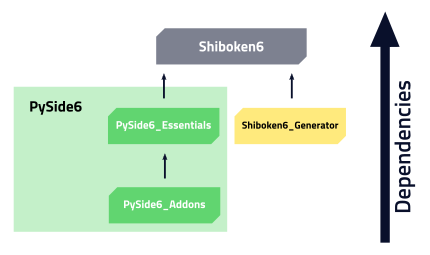Package Details¶
Having a large project as the Qt Framework available from one simple installation line:
pip install pyside6
is really beneficial, but it might be confusing to newcomers.
Besides your IDE, you don’t need to install anything else to develop your Qt application, because the same command installs many tools that will help you design UIs, use QML types, generate files automatically, translate applications, etc.
Package Dependencies¶

Starting from 6.3.0, the pyside6 package (wheel) is almost empty,
and only includes references to other packages that are required
to properly use all the modules.
This packages are:
pyside6-essentials, essential Qt modules,pyside6-addons, additional Qt modules,shiboken6, a utility Python module.
You can verify this by running pip list to check the installed
packages in your Python (virtual) environment:
(env) % pip list
Package Version
------------------ -------
pip 22.0.4
PySide6 6.3.0
PySide6-Addons 6.3.0
PySide6-Essentials 6.3.0
setuptools 58.1.0
shiboken6 6.3.0
Both pyside6-essentials and pyside6-addons contain Qt binaries
(.so, .dll, or .dylib) that are used by the Python wrappers
that enable you to use the Qt modules from Python.
For example, in the QtCore module, you will find
on Linux:
PySide6/QtCore.abi3.so, andPySide6/Qt/lib/libQt6Core.so.6
inside the site-packages directory of your (virtual) environment.
The first is the importable module which depends on the second file
which is the original QtCore library.
Note
The package shiboken6-generator is not a dependency,
and it’s not available on PyPi. The reason, is that it depends on
libclang, which is a large library that we don’t package, and
requires a special configuration for you to use. Check the Shiboken
Documentation for more details.
Tools Included¶
PySide6 comes bundled with a set of tools that assist in making the development experience with PySide6 more efficient. The list of tools can be found here.